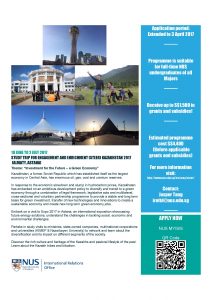Call for Applications: France and Singapore Comparative Cultural Rhetoric Academy
Programme Dates: 29 May – 10 June 2017
Description
In many places in the world, we see more and more people attempting to resolve differences (national, cultural, ethnic, or political) through physical violence. The ancient Greek art of rhetoric taught citizens ways to forestall such violent clashes through making impassioned, reasoned, and ethical appeals to their communities. Although it is unrealistic to believe that every conflict can be resolved through dialogue, rhetoric can help us understand how an image of a community is created and addressed in speech situations and what conditions make a cross-cultural encounter possible.
The Comparative Cultural Rhetorics Academy, a two-week undergraduate intensive non-credit seminar, brings the ancient art of rhetoric into contemporary Asian and European settings to help students understand how to communicate across national, cultural, ethnic, and linguistic differences. Bridging two continents, students study for one week in Singapore and one week in Reims, a French city famous for its historic and culinary heritage. This French-Singaporean collaboration pushes students to engage in intercultural dialogues across ideological, religious, and cultural differences with peers rooted in diverse historical, national, and cultural contexts and traditions.
During the Academy, students analyze and produce texts that speak across different kinds of Asian and European communicative practices. Students will examine the extent to which European rhetorical approaches and some of their key concepts (ethos, parrhesia, tropes, commonplaces) can engage both Asian and European contexts and traditions. Further, students will develop skills used in traditional academic rhetorical analyses as well as skills used in rhetorical analyses of foodscapes. Some examples may include creating a cookbook, closely reading menus, and observing foodscapes.
The academy will focus on a theme, “Rhetorics of Food.” For both France and Singapore, food is a primary marker of national identity, and it illustrates some ways in which migration and cultural contact affect language use. Therefore, the academy investigates questions such as: How do the relations between language and food negotiate identities (national, ethnic, familial, individual, cultural) in urban environments where migration, cultural contact, and linguistic contact are constant? How do we use food to communicate across linguistic differences? How do we talk about food (cookbooks, menus, food reviews)? And how do food-related rituals work as triggers for “cultural intimacy”?
The academy will hold morning meetings (e.g. discussion, lecture, instruction), afternoon workshops (e.g. researching, interviewing, writing cookbooks), and evening events and excursions (e.g. films, shared dinners), Monday-Friday, each week.
For a ‘student’s perspective’ on the programme, please refer to the following article.
Questions?
For questions, please do not hesitate to contact the co-facilitators of the Academy, Mark Brantner (National University of Singapore) and Myriam Faten Sfar (Sciences Po): cultural.rhetoric.academy@gmail.com
Cost
- Expenses, including travel and hostels, will be greatly subsidized by the Academy.
- Students will need to make a co-payment up to 1000 SGD/675 EUR.
Application
Between 12 and 16 students, divided equally between France and Singapore, will be selected. The Academy will be open to undergraduates from Sciences Po and NUS. Sciences Po and NUS faculty will select students based on a letter of interest, C.V., and a short essay. The admissions procedure may include an interview.
Closing date: Monday 27 March 2017
Interested students should apply HERE along with submission of the following:
- A Curriculum Vitae no longer than 2 pages in length (attach this via the online application page under ‘Curriculum Vitae’).
- A written statement of intent (attached this via the online application page as ‘FILE 1’) including:
| a. A short statement of your main motivation for attending this Academy;
b. One or two family or community recipes you find relevant for the theme of this Academy. We will use them both as case studies and as core materials for the cookbook we want to publish.
c. A two-page, double-spaced analysis of the recipe you chose. This short essay might deal with one of the following topics:
· Recipes and the act of transmission (e.g.: From whom and how did you receive these recipes? Who else has these recipes? What are the histories of these recipes? Who is involved in these histories? How do these recipes act as a “collective memory” for the people who have shared the recipes?)
· Recipes and Social rituals: (e.g.: Do these recipes participate in any familial or cultural rituals? [1])
· Recipes, history, globalization: (e.g.: Are the ingredients or the methods of cooking your recipes tied to patterns of migration or globalization?)
· Food in the 22nd century: (e.g.: With new ecological and demographical concerns, the way we eat will probably change quickly. How will we feed the world population by the 22nd century? Ranging from chemistry, technology, and ethics, this question can be addressed through a line of argument or by analyzing a case study (a recipe or a practice (e.g. street food) which is bound to change and adapt, or has already changed). A comparative perspective can also be taken.
|
[1] See M. Herzfeld, Cultural Intimacy-Social Poetics in the Nation-States. New York-London, Routledge, 1997
